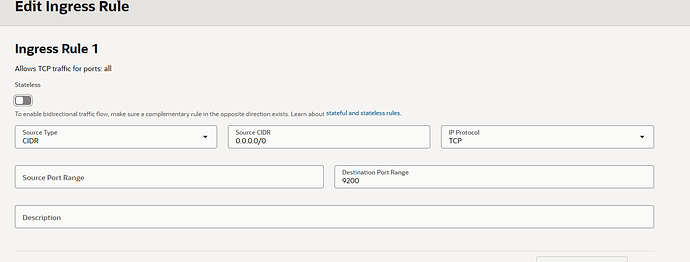I have a Oracle Cloud(OCI) machine on which I installed ElastciSearch 9.2.0 but I can access it only internally.
root@instance-20253022-1222:/var/log/elasticsearch# curl -k --user elastic:zzzzzzz -X GET "https://localhost:9200/" {
"name" : "node-1",
"cluster_name" : "elastic-de-dev",
"cluster_uuid" : "Y-x3-cLwQWqiQEZm3y6MNQ",
"version" : {
"number" : "9.2.0",
"build_flavor" : "default",
"build_type" : "deb",
"build_hash" : "25d88452371273dd27356c98598287b669a03eae",
"build_date" : "2025-10-21T10:06:21.288851013Z",
"build_snapshot" : false,
"lucene_version" : "10.3.1",
"minimum_wire_compatibility_version" : "8.19.0",
"minimum_index_compatibility_version" : "8.0.0"
},
"tagline" : "You Know, for Search"
}
I disabled IPv6 using by added in
nano /etc/elasticsearch/jvm.options
-Djava.net.preferIPv4Stack=true
netstat -tnlp
Active Internet connections (only servers)
Proto Recv-Q Send-Q Local Address Foreign Address State PID/Program name
tcp 0 0 0.0.0.0:22 0.0.0.0:* LISTEN 692/sshd: /usr/sbin
tcp 0 0 127.0.0.53:53 0.0.0.0:* LISTEN 601/systemd-resolve
tcp 0 0 0.0.0.0:111 0.0.0.0:* LISTEN 1/init
tcp 0 0 0.0.0.0:9300 0.0.0.0:* LISTEN 1857/java
tcp 0 0 0.0.0.0:9200 0.0.0.0:* LISTEN 1857/java
tcp6 0 0 :::22 :::* LISTEN 692/sshd: /usr/sbin
tcp6 0 0 :::111 :::* LISTEN 1/init
Elasticsearch configuration:
nano /etc/elasticsearch/elasticsearch.yml
# ======================== Elasticsearch Configuration =========================
#
# NOTE: Elasticsearch comes with reasonable defaults for most settings.
# Before you set out to tweak and tune the configuration, make sure you
# understand what are you trying to accomplish and the consequences.
#
# The primary way of configuring a node is via this file. This template lists
# the most important settings you may want to configure for a production cluster.
#
# Please consult the documentation for further information on configuration options:
# https://www.elastic.co/guide/en/elasticsearch/reference/index.html
#
# ---------------------------------- Cluster -----------------------------------
#
# Use a descriptive name for your cluster:
#
cluster.name: elastic-de-dev
#
# ------------------------------------ Node ------------------------------------
#
# Use a descriptive name for the node:
#
node.name: node-1
#
# Add custom attributes to the node:
#
#node.attr.rack: r1
#
# ----------------------------------- Paths ------------------------------------
#
# Path to directory where to store the data (separate multiple locations by comma):
#
path.data: /var/lib/elasticsearch
#
# Path to log files:
#
path.logs: /var/log/elasticsearch
#
# ----------------------------------- Memory -----------------------------------
#
# Lock the memory on startup:
#
#bootstrap.memory_lock: true
#
# Make sure that the heap size is set to about half the memory available
# on the system and that the owner of the process is allowed to use this
# limit.
#
# Elasticsearch performs poorly when the system is swapping the memory.
#
# ---------------------------------- Network -----------------------------------
#
# By default Elasticsearch is only accessible on localhost. Set a different
# address here to expose this node on the network:
#
network.host: 0.0.0.0
#
# By default Elasticsearch listens for HTTP traffic on the first free port it
# finds starting at 9200. Set a specific HTTP port here:
#
http.port: 9200
#
# For more information, consult the network module documentation.
#
# --------------------------------- Discovery ----------------------------------
#
# Pass an initial list of hosts to perform discovery when this node is started:
# The default list of hosts is ["127.0.0.1", "[::1]"]
#
discovery.seed_hosts: ["10.0.0.12", "193.122.48.9"]
#
# Bootstrap the cluster using an initial set of master-eligible nodes:
#
#cluster.initial_master_nodes: ["node-1", "node-2"]
#
# For more information, consult the discovery and cluster formation module documentation.
#
# ---------------------------------- Various -----------------------------------
#
# Allow wildcard deletion of indices:
#
#action.destructive_requires_name: false
#----------------------- BEGIN SECURITY AUTO CONFIGURATION -----------------------
#
# The following settings, TLS certificates, and keys have been automatically
# generated to configure Elasticsearch security features on 31-10-2025 13:30:59
#
# --------------------------------------------------------------------------------
# Enable security features
xpack.security.enabled: true
xpack.security.enrollment.enabled: true
# Enable encryption for HTTP API client connections, such as Kibana, Logstash, and Agents
xpack.security.http.ssl:
enabled: true
keystore.path: certs/http.p12
# Enable encryption and mutual authentication between cluster nodes
xpack.security.transport.ssl:
enabled: true
verification_mode: certificate
keystore.path: certs/transport.p12
truststore.path: certs/transport.p12
# Create a new cluster with the current node only
# Additional nodes can still join the cluster later
cluster.initial_master_nodes: ["instance-20251031-1515"]
# Allow HTTP API connections from anywhere
# Connections are encrypted and require user authentication
http.host: 0.0.0.0
# Allow other nodes to join the cluster from anywhere
# Connections are encrypted and mutually authenticated
#transport.host: 0.0.0.0
#----------------------- END SECURITY AUTO CONFIGURATION -------------------------
I tried to disable IPTables:
sudo iptables -I INPUT 6 -m state --state NEW -p tcp --dport 9200 -j ACCEPT
I added port 9200 into OCI firewall rules:
But still I get:
curl -k --user elastic:zzzzzzz -X GET "https://193.1z.z.z:9200"
curl: (7) Failed to connect to 193.1z.z.z port 9200: No route to host
Can you advise how to fix this issue?
